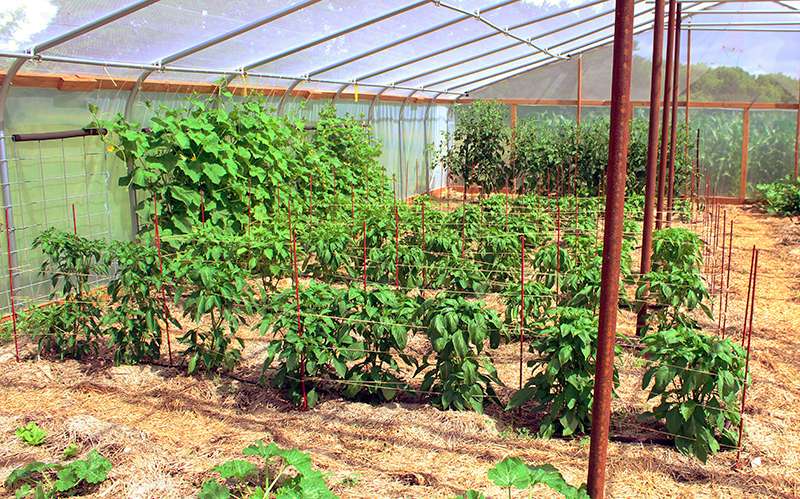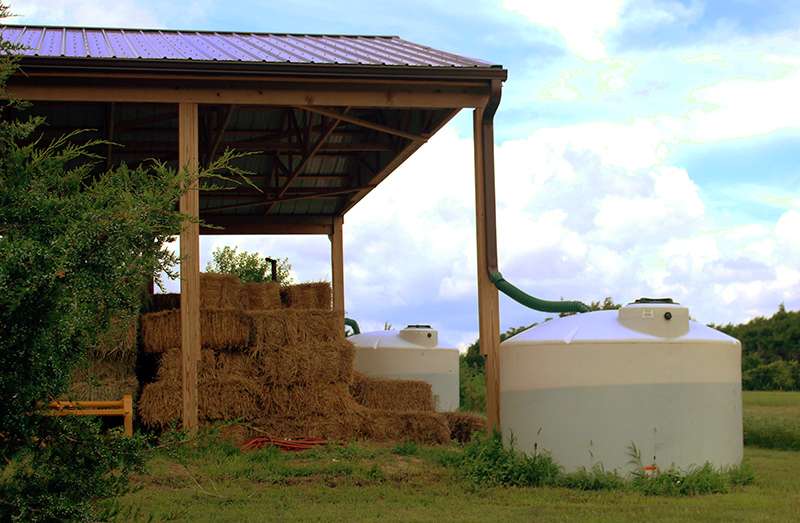
By CRISTINA JANNEY
Hays Post
A retired nurse is growing food for her community using a unique form of greenhouse.
Alice Hill of rural Luray literally wrote the book on the use of topless high tunnels — "Grow Topless: A Modified High Tunnel Design for Headache Free Extended-Season Gardening," which was published in 2019.
Hill has been able to provide produce to her community from her small farm through the farmer's market she co-founded — the Step Back in Time Food Market. She has been able to grow enough produce to sell at the market a couple of days a week on less than an acre of cultivated space.
Her tunnels are similar to most other high tunnel greenhouses. Vegetables are grown in the ground with a covering in a half circle over the top. The side walls are solid to protect tender plants from the harsh Kansas wind. However, the roofs of the topless high tunnels are made of anti-hail netting.
This allows Hill to take advantage of natural moisture and sunlight. Natural sunlight helps the plants create nutrition and tastier fruit.
The topless high tunnels result in better ventilation, while keeping out unwelcome pests, such as grasshoppers. Hill has no issues with fungal disease or condensation, and she doesn't have to worry about rolling up and letting down the sides of the tunnel.
Because the mesh netting allows the wind to go through the tunnels, the tunnels are not as vulnerable to high winds compared to other greenhouses.

Hill applied for and received a United States Department of Agricultural Natural Resource Conservation Service grant three years ago to build her 36-by-24-feet high tunnel and the following year erected a second one, 34-by-48 .
In addition to the high tunnels, she installed two 1,500-gallon tanks that collect runoff from the farm's pole shed. She uses an inline electric pump to help pump water to the vegetables through soaker hoses. Yet another rain barrel collects water from the house.
“Rural water is expensive and full of chemicals that my plants don’t like," Hill said.
She uses straw mulch to retain moisture and reduce the need for supplemental watering. However, Hill doesn't just use any straw, she seeks straw that hasn't been treated with herbicides.
The straw also keeps down weeds. Combining the drip irrigation with the mulch, the high tunnels require little maintenance once planted, Hill said.
Although Hill is not officially certified as an organic grower, she follows organic growing procedures.
“The term organic, used to be the way we all raised our food. Now its a specialty niche market, which is completely wrong," she said. “Instead of saying organic, we should say all other food is adulterated."

Hill grew up on a military base in the era of DDT and is very passionately against the use of chemical herbicides and pesticides.
"They fogged for mosquitoes with a DDT truck," she said. "We thought the cloud was so cool. We would ride our bicycles behind the truck. Birds would drop from the sky for days. That's going to be in us, in me, forever."
Hill rotates crops through the high tunnels based on the season, but she will be able to grow bok choy, kale and spinach all winter long.
She also uses crop rotation from year to year so the same plants aren't going back in the same places each year.
During the summer she grows tomatoes, peppers, cucumbers, eggplant, beans, snow peas, broccoli, summer squash, spinach and carrots in her high tunnels.
Hill didn’t grow up as a farm girl. She was a reader and passionate about how generous the earth can be to us if we work with it. She never took an agronomy class or was a master gardener. She is completely self-taught.
“I give it all back to my grandmother,” she said. “She gave me a great northern bean seed, maybe a handful of them. She said go out and plant those, so I did. I was about 8 or 9 years old. … When those things sprouted, I thought I had witnessed a miracle. I had. It's miraculous.”
She and her husband farmed for 40 years. In 1983 during the farm crisis, they went through bankruptcy and lost everything. They had two girls, so Hill ended up becoming a nurse to help support the family.
“People tell me, no one wants to work this hard,” she said. “Guess what? We all have eight to 12 hours per day. We’re all doing something. I could sit in a ginormous tractor and farm 5,000 acres and listen to 'rrrrr' and worry about paying the loan off and breaking down, or I can be on my hands and knees listening to the birds and the crickets and the frogs, pulling weeds and smelling the earth. Guess who's happier at the end of the day?
“And I know my food is going to make some other family happy,” Hill said.
Today, Hill believes in micro-food chains and buying local — neighbors feeding neighbors. She said we should be able buy meat products, milk products, bread products, cereal products, vegetables and pet food all locally.
“Can I feed the world? No, I don’t want to,” she said. “I only want to feed X number of people. [What] if the neighbor down the road feeds X number of people, and they are feeding them people food, not livestock, monocropping, chemical killers?
“We lost our ability to feed ourselves, but it can be regained,” she said.






